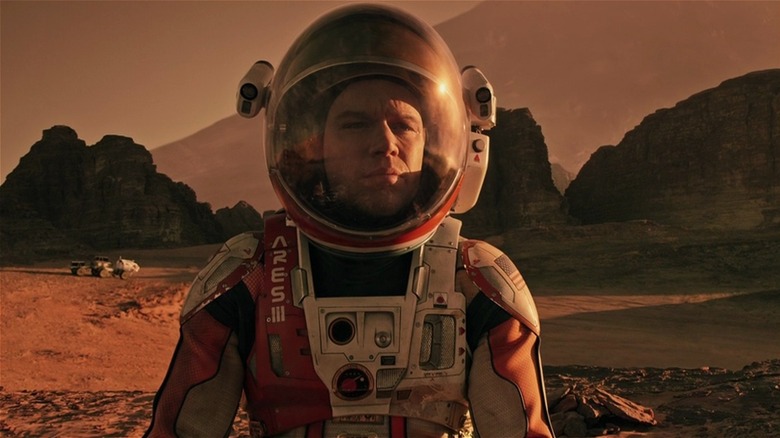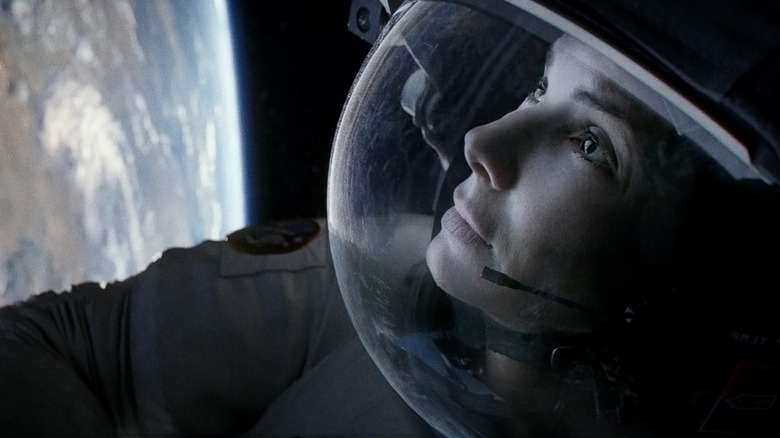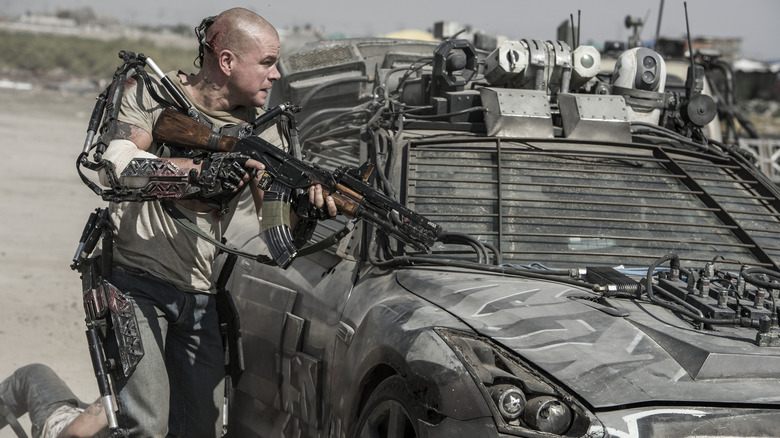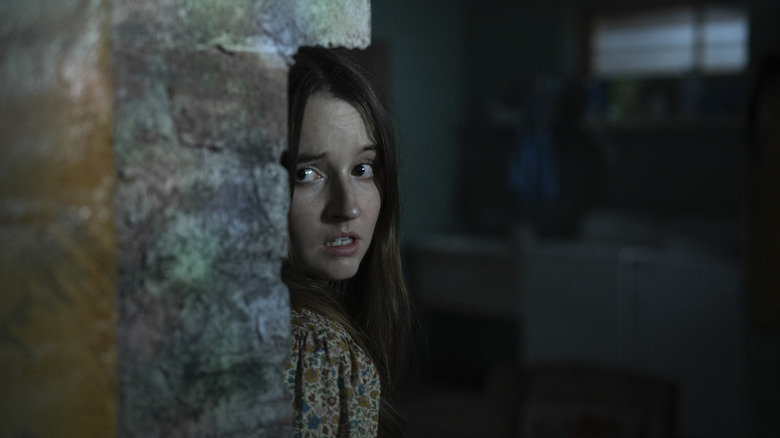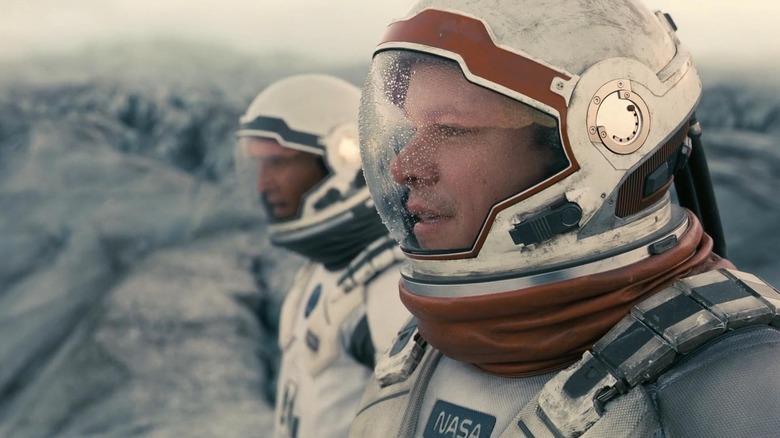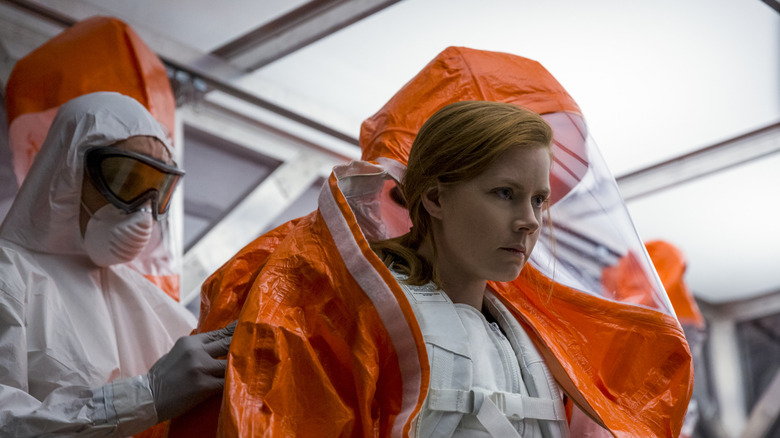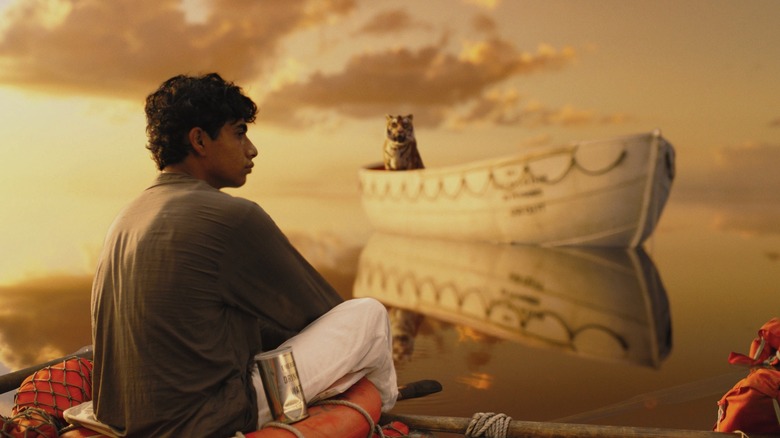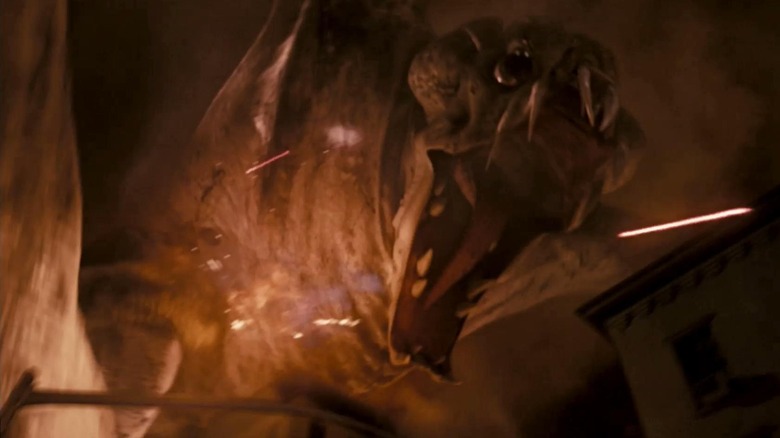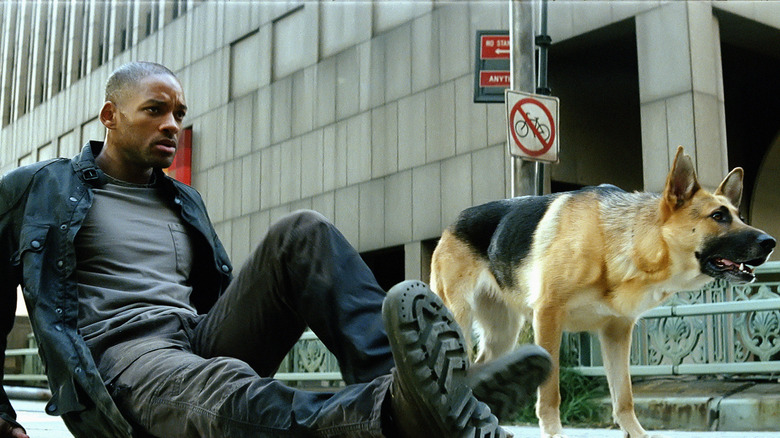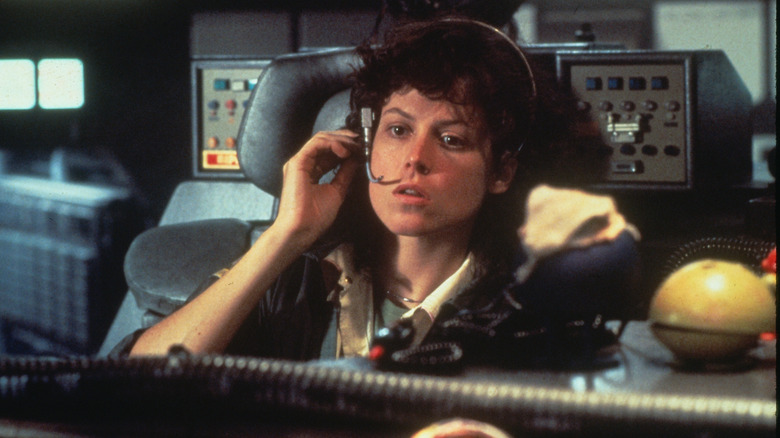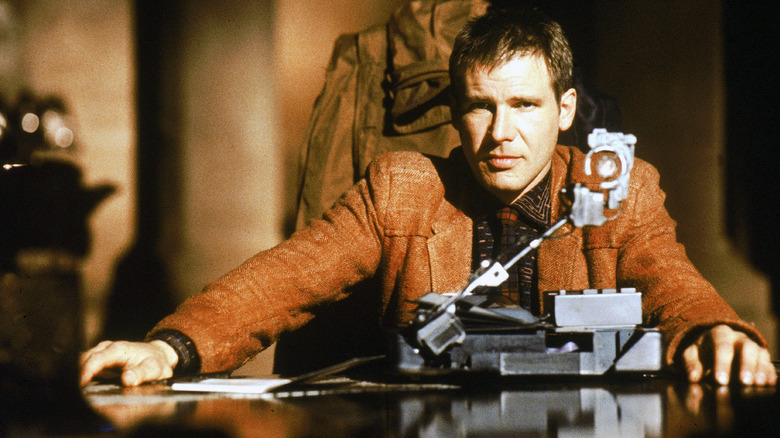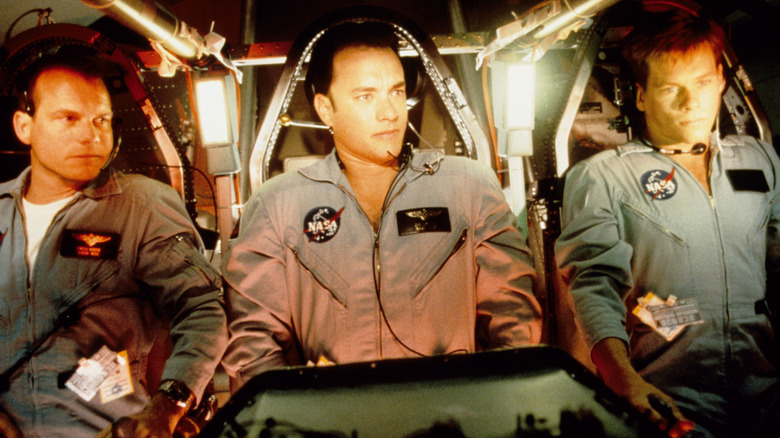11 Best Movies Like The Martian
Nearly a decade after it first hit theaters, Ridley Scott's box office sensation "The Martian" has endured as a beloved movie for many reasons. From its exhilarating opening sequence to its profoundly moving ending, not to mention all the joys in between, this adaptation of the famous Andy Weir novel of the same name is the best kind of feel-good crowdpleaser. Watching stranded astronaut Mark Watney (Matt Damon) use his intellect to survive on the surface of Mars, while people from all walks of life cooperate to get him back to Earth, is an engrossing experience. It's an uplifting movie with real heart, not to mention lots of terrific pulse-pounding suspense sequences that Scott executes with a deft hand.
Once the credits finish rolling on "The Martian," you're inevitably bound to want more. There isn't a sequel to "The Martian," nor should there be, but there are other films out there perfect for optimal follow-up viewing after this 2015 classic. Some are ideal companion pieces to "The Martian" because they're also upbeat astronaut films demonstrating humanity's greatest impulses. Others utilize key cast and crew members that were instrumental in making "The Martian" such a rich experience. Whatever the reason, these 11 great movies reminiscent of "The Martian" are ideal for keeping the cinematic high of this sci-fi spectacular going and going.
Gravity
The most obvious pick for those craving more movies like "The Martian" is another 2010s box office hit focusing on an astronaut surviving against all odds. Released in October 2013, "Gravity" combined director Alfonso Cuaron's grand visual ambitions with the limitless possibilities of outer space. Like "The Martian" giving Matt Damon a one-man show to demonstrate all his talents, "Gravity" provided Sandra Bullock plenty of room to shine as astronaut Dr. Ryan Stone. She's the central focus of "Gravity," with audiences breathlessly watching Stone scramble to survive against a lack of gravity, resources, and time, among countless other necessities.
Cuaron established his reputation as an auteur through dramas like "Y Tu Mama Tambien" and "Children of Men," neither of which would ever be considered crowdpleasers, despite all their endless artistic merits. "Gravity," though, sees Cuaron in spry filmmaking mode. He commits fully to conjuring up an array of unforgettably suspenseful scenarios for Stone to navigate, all of which could only happen in outer space. The ingenuity on-screen is irresistible, as is the visual nerve to render a lengthy opening sequence in one unbroken shot.
Bullock also makes for a compelling anchor to center the entire narrative around, effortlessly getting viewers invested in Stone and her desire to return home. Over a decade later, the emotional crux and visual effects of "Gravity" have remained breathtaking. It's a must-see — don't let "The Martian" be the only 2010s astronaut movie gem you absorb.
Elysium
Another 2013 sci-fi blockbuster that makes for a good post-"The Martian" watch is "Elysium." Helmed by "District 9" auteur Neill Blomkamp and starring Matt Damon, "Elysium" tackles the concepts of class and the wealth gap in a near-future society where the poor languish on Earth and the rich live just beyond the planet's gravitational pull. Not every weighty theme in "Elysium" gets fully realized, but it's still a wildly original ride to experience. For one thing, the deeply tangible props and sets extend Blomkamp's love for tactile sci-fi worlds in transfixing fashion. Just pausing various scenes and soaking up the rich details in the production design is enough to make "Elysium" worth a watch.
Another positive aspect is actors like Jodie Foster (doing a famously indescribable accent) and Sharlto Copley (chewing up the scenery and then some) providing a lot of fun as the primary villains. Meanwhile, Damon, Wagner Moura, and Diego Luna also provide compelling performances as more sympathetic figures in the narrative, which is punctuated with memorably distinctive action sequences.
"Elysium" is a different breed of film than "The Martian," running more on testosterone and explosions than heart and global unity. However, "Elysium," like "The Martian," vividly demonstrates Damon's commitment to sci-fi movies that aren't just typical franchise fare. For that alone, these two projects make for fascinating thematic cousins as well as great demonstrations of Damon's versatility as a leading man.
No One Will Save You
Plenty of movies exist that chronicle one person struggling to endure against impossible odds. However, those, like "The Martian," that land squarely in the science fiction genre are a lot scarcer. They're out there, though, as 2023's Kaitlyn Dever star vehicle "No One Will Save You" proves. Not only does the film focus almost exclusively on Dever — as Brynn Adams, who repels an alien invasion in her home — but it also eschews dialogue. Brynn, living on her own and isolated from society, has nobody to talk to, hence the film's ominous title. This combination of a sparse cast with minimal traditional verbiage makes "No One Will Save You" an already intriguingly bold exercise. In an age of excessive expository dialogue in streaming movies, "No One Will Save You" is a reminder of the power of physically-oriented storytelling.
What makes the proceedings even better is, like Matt Damon in "The Martian," Dever is plenty capable of headlining a motion picture by her lonesome. Her facial expressions and physicality are absorbing as she navigates the attack started by these otherworldly foes. Dever also just has an innately sympathetic quality, making her a perfect protagonist to root for in a situation that seems insurmoutable. Creative, suspenseful scenarios involving the alien invaders also make "No One Will Save You" a treat to watch. Getting off Mars may be a headache, but "No One Will Save You" vividly shows that Earth is also no picnic either when it comes to survival.
Interstellar
When audiences first saw the marketing materials for "The Martian," they may have experienced a sense of unexpected deja vu. Didn't Matt Damon just show up in a movie as an astronaut stranded on a distant planet? Before he tackled the heroic Mark Watney, Damon played a more complicated and psychologically tormented fellow in his cameo appearance in 2014's "Interstellar." This Christopher Nolan directorial effort is a grand canvas full of mesmerizing visuals and profound pathos. In Nolan's assured hands, impossible sights like the event horizon of a black hole feel as tangible as the sun rising outside your home. Talented actors like Matthew McConaughey, Anne Hathaway, and Jessica Chastain also lend palpable emotional reality to their characters as they explore a scenario spanning the entire cosmos.
Damon shows up midway through "Interstellar" as Dr. Mann, an astronaut who is far more than he appears on the surface. It's a great role for Damon, allowing him to portray a character who's more secretive and ambiguous than what Damon might normally play in one of his standard star vehicles. Casting such a notable actor for a smaller role like this also functions as a harbinger for Nolan's star-studded casting approach to "Oppenheimer" nearly a decade later. Once the credits begin rolling on "The Martian," you might be craving more space-bound Matt Damon. "Interstellar" has you covered in that regard, while offering plenty of artistic virtues beyond Damon's supporting role.
Arrival
The default mode for science fiction in American cinema is action-heavy adventures full of spectacle aimed at children and teenagers. Those movies have their place in the pop culture landscape, but they're certainly not the only way quality sci-fi cinema can manifest. On the contrary, the greatest sci-fi movies have been titles like "The Martian" that emphasize grounded humanity more than anything else. 2016's "Arrival," which opened in theaters 13 months after "The Martian," is a fantastic extension of this subgenre.
"Arrival" focuses on aliens arriving on Earth and humans deciding not to immediately kill them but instead create consistent communication with these otherworldly visitors. The only instance of violent action taken during "Arrival" — a hidden bomb detonated on one of the alien vessels — is shown to accomplish nothing but hurting humans and other species.
Much like "The Martian" is a character study of Mark Watney, director Denis Villeneuve and screenwriter Eric Heisserer's adaptation of the Ted Chiang novella "Story of Your Life" focuses on linguist Louise Banks (Amy Adams). Her saga is a compelling one, executed deftly by master performer Adams. Despite even the grandest images conjured up by Villeneuve and cinematographer Bradford Young, which strikingly remind viewers of how towering those alien ships are, Adams keeps Banks on the forefront of your mind. Her work, not to mention the film's narrative structure and intimate scope, packs an emotional wallop you'll never forget. "Arrival," like "The Martian," is everything sci-fi cinema can be.
Life of Pi
Just as sci-fi films usually adhere to one rigid model, major American movies employing lots of visual effects typically exist in just the action movie domain. However, there are exceptions to this phenomenon, with projects like "The Martian" utilizing groundbreaking visual effects in the service of stories that squarely put characterization first. 2012's "Life of Pi" also undertook this mission of exploiting all the emotional power that digital effects work can deliver.
As true fans of "Life of Pi" know, this parable of Pi (Suraj Sharma) surviving out on the ocean is a richly detailed saga. Despite often focusing only on a teenager and a tiger trapped on a boat, there's much going on theologically and thematically within this single narrative. Pi's epic quest to make it while stranded on the sea is built upon a treasure trove of visual effects making the open water and uber-realistic tiger Richard Parker look as convincing as they do.
"Life of Pi" makes the unbelievable instantly plausible with its use of digital enhancements to probe Pi's psyche. Gorgeously colorful imagery also dominates the production, even when nighttime descends upon the ocean and the screen is dominated by glittery fish and whales of all shapes and sizes. Like "The Martian," "Life of Pi" astounds with imagery that dazzles the eyes and touches the heart.
Cloverfield
Before the "Cloverfield" franchise was expanded over multiple films, there was just the original 2008 movie. "Cloverfield" was directed by eventual "The Batman" mastermind Matt Reeves and penned by another future genre movie fixture, Drew Goddard, who went on to direct "The Cabin in the Woods" and adapt "The Martian." Andy Weir's novel would never have made it to the silver screen without Goddard's work, and if curiosity beckons you to see Goddard's earlier genre projects, "Cloverfield" would be a great place to start.
Told through found footage, with a bleak atmosphere distinctly rooted in a post-9/11 world, "Cloverfield" is a darker, more tragic sci-fi creation than "The Martian." In the latter film, human beings can overcome anything, while "Cloverfield" shows how one monster utterly destroys New York City. However, the willingness of "Cloverfield" to zero in on the humanity of panicking souls who would just be background extras in a typical "Godzilla" movie does foreshadow the character-driven aesthetic of "The Martian."
From the very beginning, Goddard was interested in exploring the intricacies of the human beings occupying heightened sci-fi yarns. Plus Goddard's lifelong love for ensemble casts, which would serve "The Martian" so well, is also entertainingly displayed in "Cloverfield," which acts as a quasi-test run for some of that film's best qualities.
I Am Legend
Nearly a decade before "The Martian," director Francis Lawrence's "I Am Legend" established a famous precedent for sci-fi films centered on movie stars navigating desolate worlds alone. Rather than focusing on an astronaut stranded on Mars, "I Am Legend" follows Robert Neville (Will Smith), the last man alive in New York City years after a devastating virus wipes out humanity. The tale provides a stirring reminder that Smith isn't just a charismatic guy riding a tidal wave of nostalgia wave for his '90s and 2000s blockbusters. In "I Am Legend," he reaffirms his chops as a genuinely strong actor.
Playing opposite only a dog for nearly the entire runtime of "I Am Legend," Smith keeps the audience glued to the screen. He conjures up a balanced performance that deftly portrays Neville as convincingly able to protect himself while also showing the character's emotional vulnerability in this post-apocalyptic landscape.
The bleak atmosphere is also an interesting one for Smith, given how often he headlines light-hearted features where even a robot uprising leaves room for quips. Lawrence and Smith, though, commit to a darker atmosphere for "I Am Legend" that doesn't flinch from showing a man at his spiritual and emotional nadir as he just tries to survive another day. Sure, the infamous theatrical cut ending of "I Am Legend" leans too heavily on sentimentality and poor CGI, but otherwise, "I Am Legend," like "The Martian," is a strong blockbuster reaffirming that less is often so much more.
Alien
Decades before the novel "The Martian" was even published, director Ridley Scott brought unforgettable chills to the sci-fi genre with 1979's "Alien," his inaugural foray into sci-fi and only his second feature-length film. Despite his lack of experience in these areas, Scott demonstrated tremendous finesse bringing "Alien" to life. Even with countless sequels and pop culture parodies in the years since, the original "Alien" is still an unnerving exercise. The practical effects works looks as dazzling as ever while its most unsettling sequences haven't lost an ounce of their impact.
In one key respect, "Alien" functions as an unexpected precursor to "The Martian." The basic plot of "Alien" focuses on the crew of the Nostromo getting picked off by a xenomorph one by one, meaning that the script's home stretch focuses solely on Ellen Ripley (Sigourney Weaver). Like Mark Watney decades later, Ripley is a character that Scott zeroes in as the ultimate cosmic underdog. It should be impossible for her to evade the clutches of the alien, which is exactly why viewers cheer for her endurance.
Some sci-fi movies succumb to endless bloat and excessive grandeur, including Scott's own 2017 prequel, "Alien: Covenant." But "Alien," like "The Martian," understood how much power one compelling character can wield in sci-fi yarns. If you want to see Scott establish his legendary status as a sci-fi auteur, "Alien" is a post-"Martian" must-watch.
Blade Runner
Ridley Scott has explored so much different territory over his nearly 50-year career as a director, including the sci-fi genre, which will forever exist within this filmmaker's shadow. His impact in this realm doesn't just extend to "The Martian" and "Alien," but also includes 1982's "Blade Runner," which proved to be a game-changer for what sci-fi films could look like. Protagonist Rick Deckard (Harrison Ford) exists in a vision of 2019 Los Angeles that's drenched in rain, wear-and-tear, and smoke. This wasn't an idealistic look into tomorrow, but a glimpse into what humanity's excess and capitalistic chaos would wreak. Strikingly realized through deeply distinctive production design and practical effects, the world of "Blade Runner" is already enough to make it an unforgettable experience for many moviegoers.
However, "Blade Runner" also excels as a variation on the noir genre, with all the classic trappings of this cinematic domain blended with synthetic humans called replicants and a futuristic setting. The most pause-worthy scenes in "Blade Runner" are so worth stopping to absorb because of how deeply Scott commits to fusing together noir and science fiction into something excitingly new. As a cherry on top, iconic actors like Ford and Rutger Hauer deliver profoundly lived-in performances that make the universe of "Blade Runner" even more emotionally tangible. Granted, all these virtues create a movie that's worlds away from "The Martian" in tone and outlook on humanity. However, "Blade Runner" is another exquisite sci-fi voyage from the same cinematic maestro.
Apollo 13
If "The Martian" has you yearning for some more feel-good movies about astronauts and human beings cooperating, then look no further than "Apollo 13." Considered one of the best movies Tom Hanks ever headlined, this 1995 Ron Howard directorial effort chronicles the true story of the Apollo 13 moon mission. What's supposed to be the fifth triumphant manned voyage to the Moon becomes a perilous exercise once the ship loses its oxygen and electricity during its flight. Much like the lead characters in "The Martian" try to figure out how to bring Mark Watney home, "Apollo 13" wrings tension out of following people both on Earth and in space trying their best to get these astronauts to safe ground.
What follows is a suspenseful survival story emphasizing unity in the face of adversity. "Apollo 13" does not focus on NASA household names like Buzz Aldrin or Neil Armstrong, which is part of the point. William Broyles Jr. and Al Reinert's screenplay is about everyday individuals exhibiting heroism and cleverness under stress. This relatable quality makes the drama extra compelling, along with the fantastic collection of actors tasked with playing these men and women. Individuals ranging from Hanks to Gary Sinise to Ed Harris excel in portraying typical Americans suddenly caught up in the grand sweep of history. Like "The Martian," "Apollo 13" movingly depicts people uniting in the face of cosmic chaos rather than giving up.
